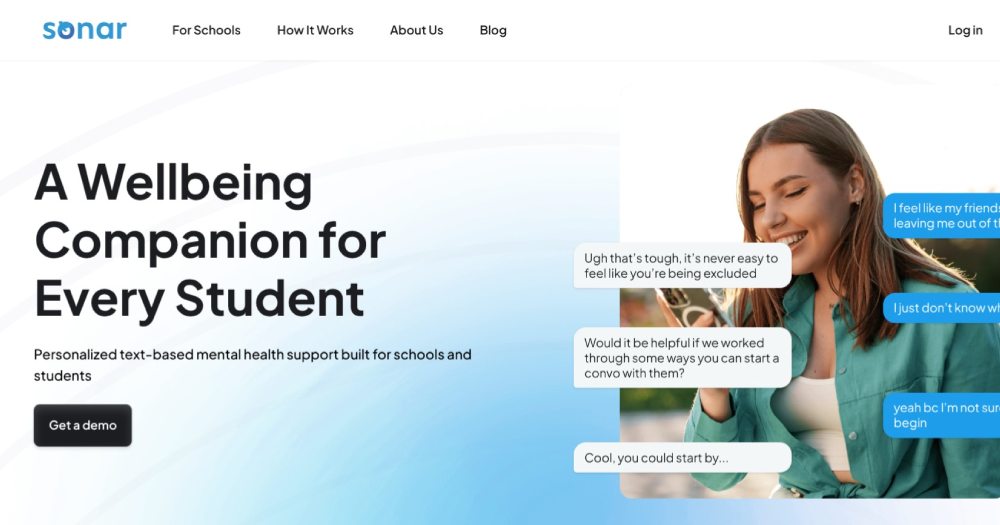This company offers digital mental health services for teens

Teen mental health is in crisis, and schools are struggling to keep up. Nearly half of all U.S. adolescents battle mental health disorders, yet many schools lack the resources to support them. Sonar Mental Health, an AI-driven platform, aims to bridge this gap and bring its solution across school districts, providing students with proactive, on-demand mental health support.
"Sonar isn't merely a project or a job for me; I see it as my personal mission to prevent another family or friend from experiencing the tragedy of losing a loved one to mental illness," says Drew Barvir, Sonar's co-founder and CEO.
How does it work?
Sonar's approach is simple but powerful — meet students where they are and provide support that feels natural and accessible.
- AI Well-being Companion: Sonny, an AI-powered chatbot, engages students via text messages, offering judgment-free, personalized support in real time.
- Human Oversight: While AI handles day-to-day interactions, trained professionals step in for high-risk cases, ensuring that students receive appropriate care when needed.
- Tech-Driven Mental Health Insights: Machine learning algorithms analyze student interactions (with consent) to detect early warning signs of distress, allowing for timely intervention.
- School Integration: Schools partner with Sonar using public funding from mental health grants, making it an affordable, scalable solution.
- Proven Engagement: Students sign up in class, and more than 75% of users report improved well-being.
Why Does It Matter?
The numbers speak for themselves:
- Gaps in School Support: Nearly one in five high schools doesn't have a single counselor, and most states exceed the recommended 250:1 student-to-counselor ratio. That leaves hundreds of thousands of students without critical support.
- Failing Alternatives: Many students turn to ChatGPT for mental health advice — proof that traditional solutions aren't cutting it. Virtual counseling platforms struggle to scale, leaving many teens without timely help.
- Academic Impact: Mental health struggles contribute to skyrocketing absenteeism. Since 2018, chronic absenteeism in K-12 schools has nearly doubled, making it harder for students to succeed.
"Sonar is bringing something entirely new to the market, supporting students all over the country with desperately needed mental health resources and creating learning environments where students flourish," says Marta-Gaia Zanchi, Managing Partner at Nina Capital.
The context
This crisis didn't happen overnight. A combination of factors — social media pressures, academic stress, and a lack of accessible mental health care — has made today's youth more vulnerable than ever.
- Generation in Crisis: Nearly half of U.S. adolescents experience mental health challenges, and 20% have a major depressive episode each year.
- Underfunded Schools: Despite growing awareness, many schools still lack the funding and personnel to provide adequate support.
- A New Approach: With AI stepping in as a scalable, cost-effective solution, Sonar is showing how technology can fill the gaps left by traditional support systems.
As schools adopt Sonar, early results show promise. Districts using the platform report lower absenteeism rates, and 98% of Sonar's partners plan to increase mental health spending.
For students, it's more than just an app — it's a lifeline. And for schools, it's a step toward a future where no student has to navigate mental health struggles alone.
Now, the question is - can something like this be launched in one of the MENA countries? There's gotta be a market for it.
💡Did you know?
You can take your DHArab experience to the next level with our Premium Membership.👉 Click here to learn more
🛠️Featured tool
 Easy-Peasy
Easy-Peasy
An all-in-one AI tool offering the ability to build no-code AI Bots, create articles & social media posts, convert text into natural speech in 40+ languages, create and edit images, generate videos, and more.
👉 Click here to learn more


